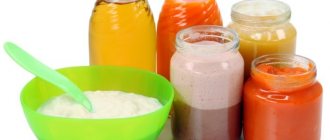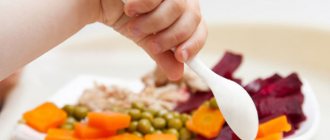- Important foods in a 7 month old baby's diet.
- Fruits and vegetables in the diet of a 7-month-old baby.
A child’s diet at 7 months must be prepared taking into account the fact that the baby’s needs change. At this age, children are already sitting, many are crawling, everyone, without exception, plays a lot and spends huge reserves of energy, which need to be replenished with proper nutrition. We have already written about what a child’s menu should be at 7 months, but if you still have questions, we suggest you familiarize yourself in more detail with the recommended diet for a 7-month-old child.
It is important to know what vegetables and fruits can be given to a child at 7 months
The baby's diet becomes more varied. With the achievement of a certain month of life, the mother introduces the child to new products.
There are situations when a parent becomes confused, not knowing what fruits a child can eat. At 7 months, it is necessary to strictly observe the amount and frequency of fruit intake.
Where to start, in what quantity, how often can fruit be offered at this age? How not to harm your baby's health? Mom will find the answer to all questions by reading the article.
To begin with, it should be recalled that all foods for a baby whose nutrition is breast milk are introduced a month later. That is, if juice can be given to an artificial baby from 3 months, to a breastfed baby - at 4. This rule applies to all new complementary feeding products, without exception.
Fruits and vegetables in a child's diet at 7 months
Undoubtedly, the diet of a 7-month-old child should include vegetables and fruits - without them, his menu cannot be considered complete. However, there are also secrets and tricks here.
- First, “introduce” your baby to vegetables, because having learned the richer taste of fruits, he will be less willing to eat vegetables. The generally recommended procedure is as follows: vegetables – cereals – fruits.
- Carrots, zucchini and broccoli are perfect as the first vegetable complementary foods. Give them to your child in the format of a one-component industrial or homemade puree. Watch your portions - this is important.
- When you are sure that the new product is well absorbed by the child’s body, you can prepare interesting mixes - add vegetables or fruits to porridge, combine fruit puree with vegetable puree, etc.
- It is better to start getting acquainted with fruits with green apples, bananas and pears. If this stage is already behind you, you can try giving your child something brighter: strawberries, currants. Exotic fruits like kiwi and mango are best left for later.
- If the child already has teeth, you can give him vegetables and fruits in small pieces, but it’s still better to start with a puree-like consistency, gradually enlarging it to the state of pieces.
Do not forget that when preparing food for a child, it is very important to observe hygiene standards. In hot weather, it is also important to follow food storage rules, and even better, to cook immediately before feeding.
What fruits should I start with if my baby is bottle-fed?
Let's figure out what fruits are. A 7-month-old bottle-fed baby can eat apples, bananas, prunes, peaches, and pears.
You need to be more careful with the pear. This fruit causes bloating and fermentation in the intestines. Therefore, it is better to give the pear to the baby in a minimal amount and in no case at night.
It is advisable to give the apple to the baby in the form of puree. First, you need to heat treat the fruit. The apple must be peeled and pitted and boiled to a puree-like consistency. You should start with half a spoon, increasing to 30 grams.
When raw, you can place the fruit in a nibbler. This is a large nipple with holes. The baby will gradually suck out the contents. In this case, you can be sure that the baby will not choke.
Prunes are known to have a laxative effect on the human body. You should not give the product to a child suffering from dysbacteriosis. But in the case when a baby suffers from constipation, prunes will come to the rescue. For a baby, based on his weight and age, 0.5-1 berries once a week is enough.
Banana is another valuable fruit. The benefits of fruit for a child's body are very great. Offer your child a quarter of the treat. If necessary, you can mix banana with milk or cottage cheese.
Peaches are also allowed for a child of this age. Give your baby a small amount of fruit to try and observe the reaction. If no rashes or redness occur, you can increase the dose to half the fruit. Now the mother knows what fruits her baby can eat at 7 months.
Dishes for a 7 month old baby
Salty, fatty and fried foods are strictly contraindicated for a child at this age. Vegetables and meat are boiled, the dishes can be slightly salted. It is prohibited to add various seasonings.
Porridge
Porridge for children 7 months old should be liquid. The ratio of cereal and liquid is no more than 5%. In order to achieve the desired consistency, you need to add 1 tsp. cereals per 250 ml of liquid. You need to grind the cereal into flour in advance, pour it into boiling water, and cook over low heat for several minutes. The dish should turn out without lumps; you can sweeten it a little and add butter. After the child is completely accustomed to the dish and in the absence of allergies to the main components, you can prepare 10% porridge: 2 tsp. cereals per 150 ml of liquid
Soups
Only pureed products are added to soups for infants. They can be cooked in weak meat or vegetable broth. Soup recipe for a 7 month old baby (required ingredients):
- boiled water – 250 ml;
- cauliflower – 60 g;
- zucchini – 60 g;
- boiled chicken breast – 20 g.
The zucchini is first peeled and the seeds are removed. Cauliflower inflorescences are washed and dried. Bring the water to a boil, add zucchini and cauliflower cut into small pieces. Boil the vegetables until tender, simmer the pre-cooked chicken fillet for 3-5 minutes. Grind the finished dish with a blender and add 1/2 tsp. butter.
Meat dishes
Pediatricians recommend combining it with vegetables or cereals. Products are pureed. The following combinations are acceptable:
- chicken and potatoes, pumpkin, rice, buckwheat;
- turkey meat and zucchini, carrots, broccoli, cauliflower.
The diet should contain only lean meats. Recipe of dish:
- The skin of the poultry meat is removed and the subcutaneous fat is removed. Wash several times and cook in lightly salted water, skimming off the foam, until tender. The fillet is cooled and chopped.
- Vegetables or cereals are boiled, pureed and combined with meat.
If the puree is too thick, you need to add a little vegetable broth to it.
Dairy products
To avoid poisoning, pediatricians recommend preparing cottage cheese for your child yourself. It is best to start complementary feeding at 7 months with kefir. If there is no allergy, the baby is given 1 tsp. cottage cheese for dinner. Necessary ingredients for homemade cottage cheese:
- milk (low-fat) – 500 ml;
- kefir – 100 ml.
Bring the milk to a boil over low heat and pour kefir into it. After 15 minutes, the whey will completely separate, and the milk will cool down during this time. The curdled mass is poured onto gauze folded in several layers and squeezed out. Fresh cottage cheese must be eaten on the same day; it cannot be stored.
Beverages
Compote for infants is made from green apples; no sugar is added to the drink. After 7-10 days, apples can be combined with pears. The compote should not turn out concentrated, so you need to take 1 small fruit per 500 ml of water. To preserve all the vitamins and minerals, the drink must be prepared correctly: the fruit is washed, finely chopped and filled with cold water. Place the container with the compote on the fire and bring to a boil. Remove the pan from the heat, cover with a lid and put in a warm place for 2 hours - during this time the drink will infuse.
Vegetable purees
Vegetables are rich in minerals, vitamins and fiber, so they are given to the child daily to normalize the functioning of the gastrointestinal tract. It is better to start complementary feeding with zucchini and cabbage (with the exception of white cabbage). Potatoes, carrots and pumpkin are gradually introduced. The dish can be enriched by adding a few green peas or beans. These vegetables do not serve as an independent dish. Vegetable puree from carrots and zucchini:
Carrots and zucchini are washed under running water and the skins are removed. If the zucchini is young, then it is not necessary to remove the seeds from it. Vegetables are cut into small pieces (to reduce cooking time) and boiled until tender in lightly salted water. Decant, place in a blender bowl and grind to a puree. If desired, you can add 1-2 tbsp to the finished dish. l. vegetable broth.
What fruits can a 7 month old baby eat?
Fresh fruits are considered the main supplier of vitamins, minerals and a source of energy. A seven-month-old baby is given apples, bananas, peaches and prunes. You need to be careful with pears: the fruit can cause bloating, so it is given in minimal quantities in the first half of the day. Sweet varieties of apples must be heat treated in advance: they are peeled, the seeds are removed and briefly simmered in boiling water, after which they are pureed.
To prevent the child from choking, the raw fruit is placed in a nibbler. The device is a large nipple with several holes. Apple juice will enter the child's mouth in small quantities. Prunes have a laxative effect, so eating dried fruit is strictly prohibited if a baby has dysbiosis. Prunes can be given no more than once a week.
Before including peach in your diet, you need to test for allergies. If negative reactions do not appear, then you can give the baby 1/4 of the fruit once.
Eggs
The product contains essential fatty acids involved in metabolic processes and in the formation of the infant's nervous system. Iron, iodine, zinc, potassium and magnesium, which have a beneficial effect on bone growth.
Despite the fact that eggs are considered a dietary product, they need to be included in the diet carefully. It is better to start complementary feeding with quail eggs - according to reviews, they do not cause allergies. The white is given to the child at 12 months, and the yolk - starting at 7 months. At first, it is added to meat and vegetable purees in small pieces (the size of 2 match heads). Eggs need to be hard-boiled (8-10 minutes).
Butter and vegetable oil
Vegetable oil is not recommended to be added to dishes; it is replaced with butter. The product is considered an additional source of energy due to its composition. “Good” cholesterol forms vital systems and has a beneficial effect on intellectual development. The oil helps prevent the development of colic and problems with bowel movements.
Formula-fed babies can be given oil from 6 months. It acts as an auxiliary component for dairy and non-dairy cereal porridges. Butter is added to dishes in a minimal amount before serving. The product improves the taste of porridge and accelerates the absorption of starch present in cereals.
The initial portion of oil in the first days of complementary feeding should not exceed 1 g. In the absence of allergies, the portion can be increased to 5 g.
Meat broths and purees
Concentrated meat broth is too heavy for a seven-month-old baby, so it must be diluted with clean water in a ratio of 1:5. After the meat is completely cooked, the broth must be strained through gauze folded in several layers. The nutritious decoction can be added to purees and soups can be prepared based on it. Extractive compounds (lactic acid, taurine, cholesterol, glucose) can negatively affect the functioning of the digestive tract, while at the same time stimulating the child’s appetite.
They begin to introduce broth into the diet after the baby has become accustomed to pureed meat. It is better to grind the fillet in a blender - this way the puree will be more homogeneous. In the first days of complementary feeding, the child can be given a special homogenized product, which can be purchased in the children's departments of the supermarket. One-component meat puree is given to a child at 7.5 months.
It is important to know!
The burning question is what vegetables and fruits are allowed. A child at 7 months must be given new foods, following simple rules:
— All products must be fresh and ripe. The weathered and rotten ones cannot be used as food for the baby! - You need to start with a minimum amount. — You shouldn’t give your little one several new foods at once. If an allergic reaction occurs, the mother will not be able to identify which fruit caused the breakdown. — All vegetables and fruits should be given pureed. This will make it much easier to digest. — If an allergic reaction occurs in the form of redness of the cheeks or rashes, it is better to forget about the new product for up to a year.
Important foods in a 7 month old baby's diet
Despite the fact that until the age of six months, children absolutely do not need anything other than mother’s milk and formula that replaces it, many mothers, giving in under the pressure of “experienced” relatives, begin to introduce new products to the child’s menu at 4 months, or even earlier. In this case, by 7 months, the baby’s breakfast, lunch and dinner already begin to resemble the nutrition of an adult child in composition - of course, you shouldn’t experiment with this, otherwise you risk getting bogged down in allergies, pancreatitis and other diseases at such a tender age. If you want to do everything right, then by 7 months the child’s diet should include the following products.
Porridge
It is no secret that porridge is the main product for children; it cannot be replaced with anything, but in order for children not to get tired of the monotony, porridge can be prepared in different ways: with low-fat milk or secondary broth. You can serve porridge with vegetables - such a mixture is considered a complete dish, highly desirable in a child’s diet.
Egg
An egg is introduced into a child’s diet after he has already tasted the most important product of the first year of life - porridge, and has also already enjoyed vegetables and fruits in the form of juices or purees. You need to start by giving your baby a hard-boiled egg yolk - first a little for testing, in several doses bringing the daily portion to half a yolk.
Meat
By the end of the 7th month of life, the child should eat 80 grams of meat per day. Give it to your child in puree format, even if the toddler already has his first teeth, because he is unlikely to be able to chew solid food well. Choose lean types of meat - white chicken or lean beef.
Bouillon
Meat broth is an excellent base for children's dishes, but few people know that children are given “secondary” broth. It is prepared as follows: lean meat is boiled in water for 10 minutes, after which the liquid is drained, and the meat, which has lost all its active ingredients, is again filled with water for 2 hours of cooking.
Is it worth saying that when eating adult food, a child should already behave like an adult? It may be too early to give him his own spoon, but it is highly advisable to sit him at the table (or in a child's high chair for feeding). However, it is still too early to put the rocking chair for feeding in the attic - at least until a year old, you can easily breastfeed your baby in it.
Healthy fruits
Having studied all the properties of plant products, we can conclude that the presence of fruits in a baby’s diet is mandatory. In addition to being healthy, they are also delicious. The baby enjoys this delicacy. What fruits can you give your child? At 7 months the list is:
1. Apples. It is better to give preference to green varieties. Source of macro- and microelements.
2. Bananas. Yellow, no black. Vitamin B6 is involved in the production of the hormone of happiness (serotonin).
3. Peaches. Without skin. The mineral content affects the formation of hemoglobin.
4. Prunes. In case of absence of loose stools and upset stomach of children.
5. Apricot. Only ripe and in small quantities. May cause allergies.
6. Pears. Carefully. Can be used as a puree in combination with an apple.
After reading the article, the mother can easily decide what fruits her child can eat. At 7 months, citrus fruits should not be given. Despite their high content of vitamin C, citrus fruits cause allergies and irritate the lining of the children's stomach.
Summarize
When wondering what fruits a 7-month-old baby can eat, don’t forget that it’s better to give a green one instead of a red apple. It is imperative to give peach without peel, as pollen is an irritant to the child’s respiratory tract. Fruits are not given on an empty stomach or for breakfast. The best time is afternoon tea.
Among vegetables, it is recommended to include zucchini, carrots, cabbage, asparagus, potatoes, and pumpkin in complementary foods. Vegetables are boiled, baked in the oven or steamed. And only after that they grind it into puree. The initial dose is 1 teaspoon.
The more fruit, the healthier it is for the child, the more varied the table. But there must be moderation in everything. There is no need to rush to give your baby everything at once. His body is still weak and susceptible to all kinds of irritants.











